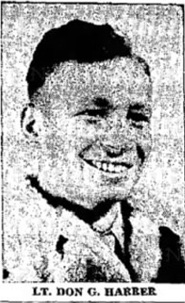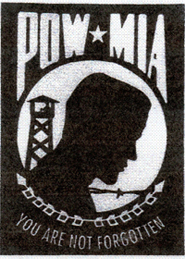35 Cerro Gordo Men Killed in Action in 2 ½ Years of War
Memorial Day this year marks almost 2 ½ years since the United States entered World War II. Of the more than 11 million men serving with the U.S. armed forces at home and overseas, it is estimated that Cerro Gordo county has contributed 4,100 men.
Prisoners of war list:
Lt. Donald G. Harrer, prisoner of German government, Feb. 11, 1944.
Source: Mason City Globe-Gazette, May 30, 1944
![]()
Prisoner Ranks Expand As War Grows Intense In France and Germany
Hopes for an eventual happy reunion at the conclusion of hostilities with father, brother, son or husband, initially reported as “missing in action” has been spurred in a number of homes in Muscatine and nearby communities in southeastern Iowa and western Illinois by later information, advising that the missing service man was listed as a prisoner of war.
Anxious hours of hopeful waiting after official information listing men as “missing in action” has been followed in repeated instances by such data during the past year, as it was in former years of World War No. 2, as the number of men who have become members of the “Barbed Wire Legion”—prisoners of war—has increased.
Then, for families and for the members of the Barbed Wire Legion, as well, has followed a second interval of waiting—until through the channels of the International Red Cross, letters and communications have been re-established.
This, in turn, is followed by further waiting—waiting for that day when peace will return and the guns of war are silenced—when long days of confinement in distant camps and restriction of privileges will come to an end and families and friends may be reunited.
As the period of America’s participation in the war has lengthened, so has the number of men listed from this community as prisoners of war.
For some, stationed in the Pacific theater of action, three years have passed in prison camps. For others, captured in other fields of action, one year in a prisoner of war camp is stretching to a second. Others, participating in more recent actions, have spent lesser periods in prison camps.
From some of these men, relatives have received fairly regular, although restricted letters, advising of their treatment, the receipt of certain items of clothing, food and for recreational purposes through the Red Cross. From others only scratches of information have been received.
From official sources and from members of their families, brief sketches of the following men reported as prisoners, have been obtained:
LT. DONALD G. HARRER—Husband of the former Betty Hakes, of Muscatine, Lt. Donald G. Harrer, of Mason City, was reported as missing in action over Germany since Feb. 11, 1944. He was a co-pilot of a Flying Fortress and arrived in England about Christmas time of 1943. He was later reported a prisoner of war in Germany.
Source: Muscatine Journal and News-Tribune, Friday, December 29, 1944
![]()
Lt. Don Harrer Arrives Home From Prison Camp
Tells How Russians Entered Camp in Cossack Fashion
It was a great day at the George Harrer and Donald G. Harrer homes Tuesday and it started before 5 o'clock in the morning, for at that time the 2 families were already waiting at the station in Manly for the train from Jefferson Barracks, Mo., to come in, bringing as one of its passengers, Lt. Harrer, recently liberated prisoner of war.
Included among those who met the train were his wife, and his young son Tommy, whom he had never seen, his parents, Mr. and Mrs. George Harrer, his sister, little Miss Mary Ellen Harrer, his sister-in-law, Mrs. Robert Harrer, and Mrs. Betty Harrer's parents, Mr. and Mrs. Lee P. Loomis.
Lt. Harrer, a little thinner than usual but looking fine, arrived in New York Friday and reached the Jefferson Barracks reception center Monday morning. He had been liberated by the Russians from Stalag Luft 1 at Barth, Germany when they entered that camp on May 1. He had remained at the camp until May 13 and during that time had learned some of the Russian tactics.
The lieutenant told how the Russians came into the camp, friendly but in typical Cossack fashion -- unorganized, yelling, and on every type of vehicle imaginable. There were horses, bicycles, trucks, jeeps, and anything on wheels. No 2 had uniforms alike, he said.
The apparent lack of organization in this wild advance Russian army is purposeful, said Lt. Harrer. They come into the enemy territory ahead of the regularly organized units for the purpose of creating terror.
They drove hogs and cows into the camp saying "There you are; help yourself -- anything the Germans have got, you can have it." And so the internees had to do their own butchering.
The camp at Barth was among the best situated of the camps, only 40 miles form the Red Cross supply center at Lubeck, though toward the last, through some change in the organization, they were receiving no supplies, Lt. Harrer said.
Source: Mason City Globe-Gazette, June 19, 1945 (photo included)
![]()

EVERYBODY'S HAPPY -- The cameramen found everybody happy at the Lt. Donald Harrer home at 1114 1st N.W. And there's good reason. The lieutenant, a prisoner of war when his son Tommy was born last July 9, came home this week to find him a boy any dad could be proud of. And no less credit goes to the little fellow's mother, Betty Hakes Harrer, who seems to have done right well by him. Tommy 's particular interest at this moment was in the black box that he figured the photographer brought out just for him.
Source: Mason City Globe-Gazette, June 21, 1945 (photo included)
![]()
Donald Grady “Grady” Harrer was born Oct. 23, 1919 to George Henry and Catherine Cecelia Grady Harrer. He died Nov. 19, 2013 and is buried in Elmwood Saint Joseph Cemetery, Mason City, IA.
Source: ancestry.com
![]()


